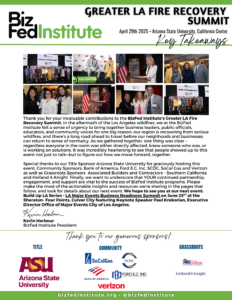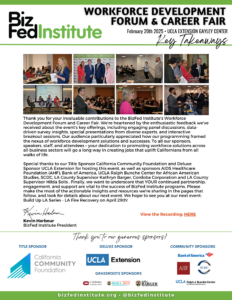
Keynote Speaker: Phil Washington, President/CEO of LA Metro, who shared many of the goals and challenges faced by Metro including but not limited to steep ridership decline and loss of revenue, strategies, and tactics on making sure vehicles were cleaned with COVID-19. Phil’s presentation made sure that we kept in mind that Metro will ensure safe ridership, that he’s leading a National Task Force to establish new best practices for ridership experience, and that Metro is focusing on equity to make share that access to transportation is available to all, especially those in underserved communities.Â
The event also had two invigorating panel discussions, with the first panel being moderated by Steve Pontell, President/CEO of National CORE and BFI Chair who guided the conversation that focused on a broad array of mobility solutions that stimulated the imagination. Marnie Primmer, Executive Director of Future Ports guided the discussion regarding the reality and promise of tomorrow’s transportation today, with a focus on women in leadership roles.
Panel 1: A Broad Array of Mobility Solutions that Re-imagines our Modes of Transportation andSupporting Infrastructure
Moderator: Steve PonTell, President/CEO National Community Renaissance, BizFed Institute Board Chair
Juanita Martinez – Regional Director, General Motors who focused on Driverless Vehicle Technology that included the vehicle features and necessary technology infrastructure to make it safe and practical. Juanita emphasized that there will be a geographical grid area mapped out in defined geographies supported by fail-safe technology.
David Grannis – President/CEO – PointCÂ who focused on the Los Angeles Aerial Rapid Transit that showcased the Gondolas that could be used to transport people from DTLA to Dodger Stadium and other points of interest that could take as many as 3,000 cars off the road. This technology will be available to underserved communities and is considered environmentally friendly
Tom Swenson – Business Development Manager, Cummins Automotive NaturalGas Group who advised us on the benefits of a natural gas engine and how their trucks can assist us in reaching our clean air goals and pave the way for a cleaner environment and better health. Tom insisted that we must adapt to a changing environment by considering and implementing new technology
Megan Pritchard – General Manager, Uber Air shared Uber’s plan to offer multi-propeller driven aerial vehicles that can transport passengers from the airport to points of interest that will save time, air quality and be cost effective and financially accessible by all income levels due to a pricing strategy that competes with ridesharing. Uber is one of those companies that is leading the charge to new ways of cleaner rideshare travel options in urban communities and the region in general.
Panel 2: The Reality and Promise of Tomorrow’s Transportation Today, with Acknowledgement of Women in Leadership Positions in Transportation
Moderator: Marnie Primmer, Executive Director Future Ports
Hilary Norton – Acting Chair of the CA Transportation Commission and President/CEO of FAST gave us insight and recommendations for reducing congestion on and maintaining freeway and highway corridors, strategies and status of funding these improvements, benefits of multiple choices for modes of transportation, and a look at how DTLA will be the focus of growth (30%) for a future of LA and a need to implement solutions now. Â
Stella Li – President/CEO,BYDÂ who was replaced by Frank Girardot – Director who spoke on the value of EV and the impact they have on the environment and how BYD is contributing to clean air mandates for buses. BYD is also seeking to introduce above ground Skyrail which offers above ground transportation to significantly reduce travel time in our most crowded corridors while reducing emissions and promoting cleaner air. They’re also integrating COVID-19 safe riding compartments to reduce virus transmission.
Stephanie Wiggins – President/CEO Metrolink gave insight on how the SCORE project is a relief valve for congested freeways by getting longer distance commuters to work daily which takes the stress off our freeway corridors. The presentation also gave statistics and data on the massive numbers of people who take fewer trips in their cars which has a direct correlation to cleaner air and reduced emissions. Metrolink’s rail project will transport people and freight and will offer 1 million jobs and reduce over 50 million metric tons of CO2. Metrolink is also faced with reduce ridership and must provide a clean and safe strategy to get riders back on board.
Julia Levin – Executive Director, Bioenergy Association of CAÂ gave a very interesting presentation on the value of how biowaste can serve as a sustainable energy fuel option that addresses lifecycle emissions, cost-effectiveness, and reliability. There was a particular focus on near-zero emissions goals, lowered carbon footprint, and how we need to focus on bioenergy options. The Rialto Bioenergy Facility will go a long way in ensuring the long term stability of this fuel option as an alternative to diesel fuels.
Closing Remarks: Jonathan Parfrey, Executive Director of Climate Resolve captured the highlights of the day as described in this recap and summarized the areas of commonality and consensus that wove the discussion together. He also made sure that all the participants knew that they had meaningful roles, delivered on expectations, and challenged everyone to embrace inclusiveness moving forward in order to achieve ever-evolving modes of transportation, their respective energy choices, and the transportation infrastructure to support them.
Areas of Consensus and Opportunities for Collaborations:
*We need transportation options that reduces congestion
*Those options must lower emissions and embrace a clean air strategy
*The fuel alternatives must be cost effective
*Mass transit must offer a safe alternative in lieu of COVID-19
*We must create emerging technology that offers alternative modes of transportation that will reduce the stress on our transportation infrastructure
*There is no one option, it must be a combination of options to get this done
*We must identify funding sources and strategies in get these ideas off the drawing board and into development
*Remove public policy and introduce legislation that is complementary to our “Future of Transportation”
*This needs to be a Public,Private Partnership (PPP)



